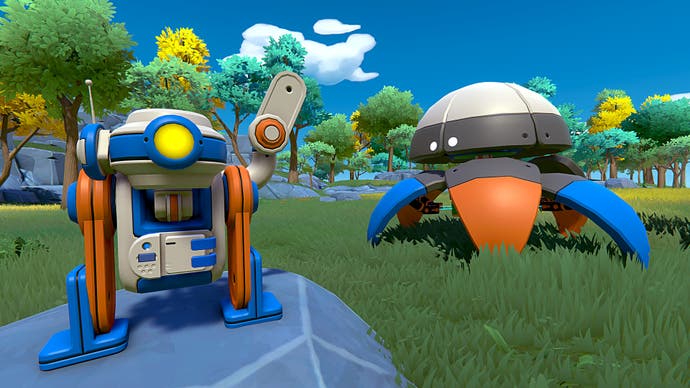Plasma is an engineering sandbox with dizzying potential
And it's out next year.
I had an interview with the team behind Plasma. Sadly, I listened back to the transcript and it's fifteen minutes of me laughing with delight, while heavy aircraft are clearly going through maneuvers overhead. No matter. Plasma is dizzyingly complex, but very easy to explain. It's an engineering sandbox game. You make stuff in a 3D world using pre-made parts and simplified code, and then you can share it with other people.
What kind of stuff? The team isn't sure - as in, they aren't sure where the boundaries are. People are going to make dioramas and games and working Babbage engines no doubt. Over the course of my interview I saw a working Pong machine, with a screen to play the game on and a decent run at the classic Pong cabinet. I saw a bunny robot with an emoji face and massive feet that kept falling over. I saw an articulated hand the size of a house that moved between waving and giving me a brisk thumbs-up. When doesn't that add something to your day? Oh yes, and a horrible robot spider that had basic player-seeking capabilities.
All of this in a 3D world with gentle hills, blue skies and green grass. But how does it work? To answer this I was shown a little remote control car that could be steered with a joypad. And then the developers made a second car, shaping basic blocks, putting on an engine and wheels and a device for programming steering, and then disappearing into a sort of drag-and-drop code space in which you can cobble together inputs and outputs, and tweak endlessly if that's your thing.
I was left with the sense of an extremely powerful tool, but one which I might be too afraid to use. And yet! You can share and import any object in the game, and break down which bits it's been made of, which inputs have been fiddled with and all that jazz. I can imagine importing something beautiful and then fiddling and breaking it in interesting, awful ways, each time learning a bit more about what I'm doing. The game enters early access next year, and the developers agree when I suggest the importing business means that it supports a wide variety of learning styles. (There will be a proper tutorial, I am told.)
Weirdly, Plasma is the work of the developers of Poly Bridge and Kingdom, Patrick Corrieri and Marco Bancale. They were chatting together and realised that the dream games that they both wanted to make next was the same game, so they pooled resources.
Plasma's that game. And I can see why. It's terrifying - even if you don't import that spider - but it's also wonderfully exhilarating. Somebody is going to find this at just the right time, and it's going to blow their mind.


